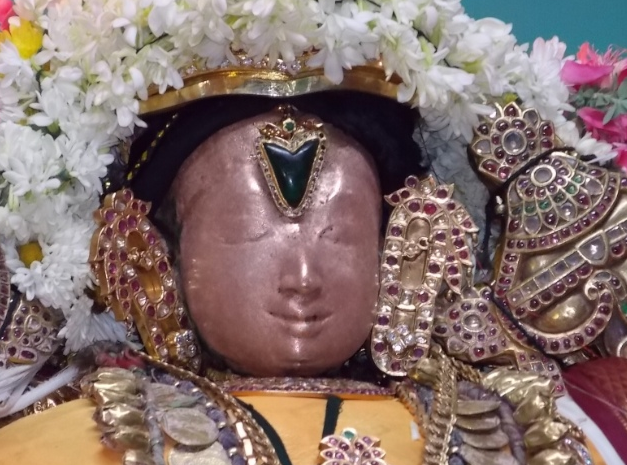srI:
srImathE satakOpAya nama:
srImathE rAmAnujAya nama:
srImath varavaramunayE nama:
Full series >> First Centum >> Sixth decad
Introduction for this pAsuram
Highlights from thirukkurukaippirAn piLLAn‘s introduction
Thus speaking about being blessed unconditionally by emperumAn with abundance (of devotion) for a while (in-between), subsequently, AzhwAr speaks towards those who consider themselves unqualified to serve emperumAn to remove their shyness and explains emperumAn‘s glorious qualities to them.
Highlights from nanjIyar‘s introduction
In fifth pAsuram – AzhwAr explains that for those who are fully existing for emperumAn‘s pleasure, emperumAn is infinitely enjoyable.
Highlights from vAdhi kEsari azhagiya maNavALa jIyar‘s introduction
See nanjIyar‘s introduction.
Highlights from periyavAchchAn piLLai‘s introduction
See nampiLLai‘s introduction.
Highlights from nampiLLai‘s introduction as documented by vadakkuth thiruvIdhip piLLai
Fifth pAsuram – Again, AzhwAr starts engaging in his original initiative – When someone approaches sarvEsvaran, he analyses “Will they seek out ulterior benefits and leave? Will they seek out for me only?” and says that emperumAn remains infinitely enjoyable for those who seek out him alone.
pAsuram
கொள்கை கொளாமை இலாதான்
எள்கல் இராகம் இலாதான்
விள்கை விள்ளாமை விரும்பி
உள் கலந்தார்க்கு ஓர் அமுதே
koLgai koLAmai ilAdhAn
eLgal irAgam ilAdhAn
viLgai viLLAmai virumbi
uL kalandhArkku Or amudhE
Listen
Word-by-Word meanings (based on vAdhi kEsari azhagiya maNavALa jIyar‘s 12000 padi)
koLgai – quality of accepting (seeing good qualities)
koLAmai – quality of rejecting (seeing bad qualities)
ilAdhAn – one who does not have
eLgal – emotion (that leads to rejecting)
irAgam – desire (that leads to accepting)
ilAdhAn – neutral person who does not have
viLgai – (accepting ulterior benefits and) leaving
viLLAmai – (being fully focussed on serving emperumAn and) staying together
virumbi – seeing that
uL kalandhArkku – for those (who are inseparable from him) who entered (his heart)
Or – distinct
amudhu – eternally nectarean (relishable)
Simple transalation (based on vAdhi kEsari azhagiya maNavALa jIyar‘s 12000 padi)
bhagavAn who does not accept some (seeing their good qualities) and reject others (seeing their bad qualities), who is neutral and does not have emotions and desires, sees that he is distinctly relishable for those who seek out him alone (and not for the others who seek out ulterior benefits).
vyAkyAnams (commentaries)
Highlights from thirukkurukaippirAn piLLAn‘s vyAkyAnam
See vAdhi kEsari azhagiya maNavALa jIyar‘s translation. piLLAn highlights that emperumAn gives himself to those who desire him alone and he gives ulterior benefits to those who seek out such benefits from him (thus he being neutral in providing what each individual seeks out from him).
Highlights from nanjIyar‘s vyAkyAnam
See nampiLLai‘s vyAkyAnam.
Highlights from periyavAchchAn piLLai‘s vyAkyAnam
See nampiLLai‘s vyAkyAnam.
Highlights from nampiLLai‘s vyAkyAnam as documented by vadakkuth thiruvIdhip piLLai
- koLgai koLAmai ilAdhAn – bhagavAn does not engage individuals in service based on “this person is great in birth, actions, knowledge etc., so I will engage him in confidential service; this other person is not so great in birth, actions, knowledge etc., so I will engage him in insignificant external service”.
Though he does not discriminate while engaging individuals in service, does he think about them like that?
- eLgal irAgam ilAdhAn – Even in his divine heart, he does not discriminate. In “Idum eduppumil Isan” – his neutral nature while they approach him is explained. Here his neutrality while engaging them in service is highlighted.
- viLgai viLLAmai virumbi – He only expects this aspect (explained further).
- viLgai – Leaving, after achieving ulterior motives.
- viLLAmai – Being together always with kainkaryam as the only motive.
- virumbi – encouraging.
- uL kalandhArkku – Those who approach him with serving him alone as the goal – ones who has seamlessly mixed with him.
- OramudhE – he will be distinct nectar; AzhwAr himself says in thiruvAimozhi 5.8.1 “ArAvamudhu” (unflinching nectar).
In the next article we will enjoy the next pAsuram.
adiyen sarathy ramanuja dasan
archived in https://divyaprabandham.koyil.org
pramEyam (goal) – https://koyil.org
pramANam (scriptures) – http://granthams.koyil.org/
pramAthA (preceptors) – http://acharyas.koyil.org
srIvaishNava education/kids portal – http://pillai.koyil.org
